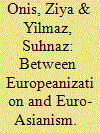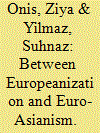| Srl | Item |
| 1 |
ID:
087004


|
|
|
|
|
| Publication |
2009.
|
| Summary/Abstract |
Focusing on Turkish foreign policy in the post-Cold War era, this paper argues that the period can be divided into three distinct phases: an initial wave of foreign policy activism in the immediate post-Cold War context; a new or second wave of foreign policy activism during the Justice and Development Party (Adalet ve Kalk?nma Partisi, AKP) government era with a strong emphasis on Europeanization; and the more recent tension between Europeanization and Euro-Asianism. This paper argues that during the AKP era Turkey maintained considerable continuity in terms of foreign policy activism and a multilateral approach to policymaking. Yet at the same time, a certain discontinuity or rupture can be identified starting in the middle of the first AKP government's reign, signifying a shift from a commitment to deep Europeanization to loose Europeanization along with a parallel shift to a soft Euro-Asianism. Ultimately, the interaction between an intricate set of priorities on the domestic and international fronts will determine the future path of Turkish foreign policy.
|
|
|
|
|
|
|
|
|
|
|
|
|
|
|
|
| 2 |
ID:
087006


|
|
|
|
|
| Publication |
2009.
|
| Summary/Abstract |
Focusing on Turkish foreign policy in the post-Cold War era, this paper argues that the period can be divided into three distinct phases: an initial wave of foreign policy activism in the immediate post-Cold War context; a new or second wave of foreign policy activism during the Justice and Development Party (Adalet ve Kalk?nma Partisi, AKP) government era with a strong emphasis on Europeanization; and the more recent tension between Europeanization and Euro-Asianism. This paper argues that during the AKP era Turkey maintained considerable continuity in terms of foreign policy activism and a multilateral approach to policymaking. Yet at the same time, a certain discontinuity or rupture can be identified starting in the middle of the first AKP government's reign, signifying a shift from a commitment to deep Europeanization to loose Europeanization along with a parallel shift to a soft Euro-Asianism. Ultimately, the interaction between an intricate set of priorities on the domestic and international fronts will determine the future path of Turkish foreign policy.
|
|
|
|
|
|
|
|
|
|
|
|
|
|
|
|
| 3 |
ID:
087005


|
|
|
|
|
| Publication |
2009.
|
| Summary/Abstract |
The monumental progress made by Turkey since the late 1990s towards the establishment of solid democratic institutions and politics can be counted as the greatest success story of the European Union's enlargement policy. Arguably, the EU has been an indispensable partner-not just an accessory-towards that progress. At the same time, a consolidated EU-Turkey relationship has much broader political implications than merely the strengthening of Turkish democracy. For a number of reasons, that consolidated relationship also has a strong impact on the evolution of the overall international order.
|
|
|
|
|
|
|
|
|
|
|
|
|
|
|
|
| 4 |
ID:
087008


|
|
|
|
|
| Publication |
2009.
|
| Summary/Abstract |
Turkey's role in the ongoing revision of the Euro-Atlantic security framework has ranged from vague to problematic. This has paralleled Turkey's protracted and equally problematic application for EU membership. Turkish dissatisfaction with this treatment has been forcefully expressed through the rejection of the Berlin Plus agreement. This paper argues that this course is counterproductive. The Euro-Atlantic security alliance needs Turkish cooperation and collaboration as much as Turkey needs it, particularly with respect to the ISAF mission in Afghanistan. Mutual policy "blind spots" can be eliminated if the stakeholders can focus on substantive policy goals rather than near-term disputes based on cultural disconnect.
|
|
|
|
|
|
|
|
|
|
|
|
|
|
|
|
| 5 |
ID:
087010


|
|
|
|
|
| Publication |
2009.
|
| Summary/Abstract |
This paper looks at Turkey's aspirations to be an energy hub for oil and natural gas exports from the Caspian Sea region and beyond. After exploring the intense politics surrounding the demarcation and siting of export pipelines from the Caspian Sea, the author goes on to discuss the complex geopolitics of the region. The article analyzes the impact of the summer 2008 Georgian-Russian war on Turkey's hopes and will illustrate the contradictions in Ankara's energy policies. The author argues that Turkey must balance its aspirations to be central to regional export schemes and its increasing energy dependence on Russia.
|
|
|
|
|
|
|
|
|
|
|
|
|
|
|
|
| 6 |
ID:
087007


|
|
|
|
|
| Publication |
2009.
|
| Summary/Abstract |
When the European Union started its Common Foreign and Security Policy (CFSP), it left the elaboration and implementation of decisions having defense implications for the Western European Union (WEU) for the next six years. NATO partners Norway, Iceland, and Turkey were invited as "associate members," enabling them to participate in the activities and regular meetings of the WEU Council. This paper argues that the WEU arrangement could serve as an example for an interim arrangement for areas of mutual interest. After an examination of past practice on CFSP and European Security and Defense Policy (ESDP), the paper formulates possible future options not only in the security field but also in energy, justice, and home affairs in combating organized crime, a new "economic zone," and the implications of the EU Neighborhood Policy, where institutional and practical arrangements might serve as milestones in the negotiating process without detracting from the ultimate objective of full membership.
|
|
|
|
|
|
|
|
|
|
|
|
|
|
|
|
| 7 |
ID:
087009


|
|
|
|
|
| Publication |
2009.
|
| Summary/Abstract |
Turkey has increased its diplomacy, trade, and investment with the states of the Gulf Cooperation Council (GCC) and since September 2008 has committed to a "strategic dialogue" with the GCC. Can Turkey and the GCC engage in security cooperation to meet common threats emanating from a nuclear Iran, radical Islamists, and instability in Iraq? Turkey's need to obtain Iranian energy supplies and cooperation in combating Kurdish terrorism and GCC concerns not to alienate Iran suggest that Turkey and the GCC will proceed cautiously and will need to take additional steps to facilitate their security cooperation.
|
|
|
|
|
|
|
|
|
|
|
|
|
|
|
|
| 8 |
ID:
087011


|
|
|
|
|
| Publication |
2009.
|
| Summary/Abstract |
With the US invasion of Iraq in 2003, Turkish-American relations seem to have taken a turn for the worse, and Turkey has been breaking records of anti-American sentiments for the last five years. Although this represents an unprecedented decline in this 60-year-old strategic alliance, the relationship has been of a highly dialectical nature throughout time, encompassing factors of both continuity and change. This essay identifies the geostrategic dimension, Turkish domestic politics, and the role of ethnic lobbies in the United States as factors of continuity, whereas the new paradigms of Turkish foreign policy, the war in Iraq, and the rise of anti-Americanism in Turkey appear as factors of change. The final synthesis of this equation will be determined as much by international circumstances as by internal developments in both countries, including the new administration in the United States.
|
|
|
|
|
|
|
|
|
|
|
|
|
|
|
|